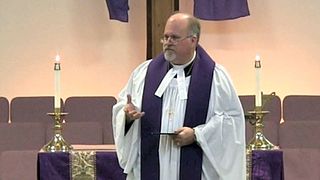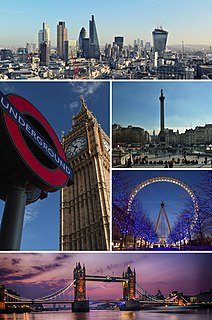
The Puritans were English Protestants in the 16th and 17th centuries who sought to purify the Church of England of Roman Catholic practices, maintaining that the Church of England had not been fully reformed and needed to become more Protestant. Puritanism played a significant role in English history, especially during the Protectorate.

The Dissolution of the Monasteries, sometimes referred to as the Suppression of the Monasteries, was the set of administrative and legal processes between 1536 and 1541 by which Henry VIII disbanded monasteries, priories, convents and friaries in England, Wales and Ireland, appropriated their income, disposed of their assets, and provided for their former personnel and functions. Although the policy was originally envisaged as increasing the regular income of the Crown, much former monastic property was sold off to fund Henry's military campaigns in the 1540s. He was given the authority to do this in England and Wales by the Act of Supremacy, passed by Parliament in 1534, which made him Supreme Head of the Church in England, thus separating England from Papal authority, and by the First Suppression Act (1535) and the Second Suppression Act (1539).

John Whitgift was the Archbishop of Canterbury from 1583 to his death. Noted for his hospitality, he was somewhat ostentatious in his habits, sometimes visiting Canterbury and other towns attended by a retinue of 800 horses. Whitgift's theological views were often controversial.

Edmund Grindal was an English Protestant leader who successively held the posts of Bishop of London, Archbishop of York and Archbishop of Canterbury during the reign of Elizabeth I of England. Although born far away from the centres of political and religious power, he had risen rapidly in the church during the reign of Edward VI, and was nominated Bishop of London, but the death of the King prevented him taking up the post and along with other marian exiles he fled to the continent during the reign of Mary I. On the accession of Elizabeth I he returned and resumed his rise in the church, culminating in his appointment to the highest office.
The Elizabethan Religious Settlement, which was made during the reign of Elizabeth I, was a response to the religious divisions in England during the reigns of Henry VIII, Edward VI, Lady Jane Grey, and Mary I. This response, described as "The Revolution of 1559", was set out in two acts of parliament. The Act of Supremacy of 1558 re-established the Church of England's independence from Rome, with parliament conferring on Elizabeth the title Supreme Governor of the Church of England while the Act of Uniformity of 1559 re-introduced the 1552 Book of Common Prayer (BCP) which contained the liturgical services of the church with some modification in a more Catholic direction regarding the doctrine of the Real Presence; permission to use the traditional Mass vestments other articles of clergy dress in accordance with the Ornaments Rubric of 1549 which stated that these were such as in use in the first year of the reign of Edward VI when services were still in Latin; and liturgical furniture The BCP became the yardstick of Anglicanism, which came to see its identity mainly in liturgy and institutional continuity rather than in a systematic school or confessional theology; and also to a lesser extent as set forth in the Thirty-Nine Articles of Faith which sought to navigate a middle way between Roman Catholicism, Continental Protestantism and radical sects.

In Christianity, a minister is a person authorized by a church, or other religious organization, to perform functions such as teaching of beliefs; leading services such as weddings, baptisms or funerals; or otherwise providing spiritual guidance to the community. The term is taken from Latin minister, which itself was derived from minus ("less").

The history of the Anglican Communion may be attributed mainly to the worldwide spread of British culture associated with the British Empire. Among other things the Church of England spread around the world and, gradually developing autonomy in each region of the world, became the communion as it exists today.

Impropriation, a term from English ecclesiastical law, was the destination of the income from tithes of an ecclesiastical benefice to a layman. With the establishment of the parish system in England, it was necessary for the properties to have an owner. This was the parochianus or parson/rector who was sustained by the benefice income while providing personally for the cure-of-souls. The parson was technically a corporation sole. With the passage of time, the benefice came to be considered a piece of property whose holder could discharge the spiritual responsibilities by a deputy and many were appropriated by monasteries or other spiritual corporations. These were bound to provide for a cleric for the cure of souls in the parish but could use any excess income as they pleased. The deputy was often known as the 'vicar'.

The Scottish Reformation was the process by which Scotland broke with the Papacy and developed a predominantly Calvinist national Kirk (church), which was strongly Presbyterian in outlook. It was part of the wider European Protestant Reformation that took place from the sixteenth century.
Jacqueline Eales is professor of early modern history at Canterbury Christ Church University and was appointed president of the Historical Association in 2011. She was educated at the University of London, where under the supervision of Conrad Russell she completed a PhD on the Harleys of Brampton Bryan and the English Civil War, which was later published under Cambridge University Press. She then taught at the University of London and the University of Kent, before taking up a post at what was then Canterbury Christ Church University College, now Canterbury Christ Church University. Her research interests also extend into the realm of women's history, which has led her to make a significant contribution to the Oxford Dictionary of National Biography, correcting the very masculine bias of the original dictionary. Her recent work, Women in Early Modern England, 1500–1700, published under UCL press has helped open up this under explored area of research. As a testament to Eales' ability as a researcher, writer and an inspiring teacher she received a national teaching award in 2006.
Thomas Sampson was an English Puritan theologian. A Marian exile, he was one of the Geneva Bible translators. On his return to England, he had trouble with conformity to the Anglican practices. With Laurence Humphrey, he played a leading part in the vestments controversy, a division along religious party lines in the early years of the reign of Elizabeth I of England.

The English Reformation was a series of events in 16th-century England by which the Church of England broke away from the authority of the Pope and the Roman Catholic Church. These events were, in part, associated with the wider process of the European Protestant Reformation, a religious and political movement that affected the practice of Christianity across western and central Europe during this period. Many factors contributed to the process: the decline of feudalism and the rise of nationalism, the rise of the common law, the invention of the printing press and increased circulation of the Bible, and the transmission of new knowledge and ideas among scholars, the upper and middle classes and readers in general. However, the various phases of the English Reformation, which also covered Wales and Ireland, were largely driven by changes in government policy, to which public opinion gradually accommodated itself.
The Rule of the Major-Generals from August 1655 – January 1657, was a period of direct military government during Oliver Cromwell's Protectorate. England and Wales were divided into ten regions; each governed by a major-general who answered to the Lord Protector.
Patrick "Pat" Collinson was an English historian, known as a writer on the Elizabethan era, particularly Elizabethan Puritanism. He was emeritus Regius Professor of Modern History, University of Cambridge, having occupied the chair from 1988 to 1996. He once described himself as "an early modernist with a prime interest in the history of England in the sixteenth and seventeenth centuries."

The history of modern Christianity concerns the Christian religion from the end of the Early Modern era to the present day. The Early Modern history of Christianity is usually taken to begin with the Protestant Reformation c. 1517–1525 and ending in the late 18th century with the onset of the Industrial Revolution and the events leading up to the French Revolution of 1789. This article only covers 1720 to the current date. For the early modern period, see the articles on the Protestant Reformation, the Counter-Reformation and the Catholic Church and the Age of Discovery.

The reign of Elizabeth I of England, from 1558 to 1603, saw the rise of the Puritan movement in England, its clash with the authorities of the Church of England, and its temporarily effective suppression as a political movement in the 1590's by judicial means. This of course led to the further alienation of Anglicans and Puritans from one another in the 17th century during the reign of King James (1603-1625) and the reign of King Charles I (1625-1649), that eventually brought about the English Civil War (1642-1651), the brief rule of the Puritan Lord Protector of England Oliver Cromwell (1653-1658), the English Commonwealth (1649-1660), and as a result the political, religious, and civil liberty that is celebrated today in all English speaking countries.
The Reformation of Manners was an ideological drive to bring religious discipline to English parishes between the late 1600s and the early 1700s, and later in the 1780s, with William Wilberforce as a major instigator. Following the sixteenth-century religious reformation in parts of England, Calvinism heavily influenced the governance of many parishes. These parishes were governed by a series of local presbyteries, a group of church elders that saw their duty in the regulation of morals in accordance with scriptural principles. Calvinist theology encouraged a dualistic distinction between the 'godly' and the 'reprobate' of the parish: it was thought that the 'better sort' of inhabitant should be responsible for policing and disciplining the behaviour of their 'vulgar' neighbours. In practice, the 'word of God' was brought to bear on communities through pastoral supervision, an enforced focus on scriptural education ), attempts to increase literacy, mandatory repetition of catechisms and the suppression of many popular pastimes, including parish wakes, seasonal festivities, drinking and bear-baiting. This impulse is perhaps best exemplified in Richard Baxter's ministry over Kidderminster in Worcestershire between 1641 and 1660. Baxter, often referred to as 'the saint of the Puritans', had an exalted view of his ministerial office and pastoral duties, striving to bring moral discipline to his parishioners. Baxter's ministry is an extreme example but the Reformation of Manners was also manifested as a wider initiative in the church courts throughout England more generally. The seventeenth and eighteenth centuries, particularly, saw these courts take a leading role in enforcing the moral principles of the Anglican Church.

Historians have produced and worked with a number of definitions of Puritanism, in an unresolved debate on the nature of the Puritan movement of the 16th and 17th century. There are some historians who are prepared to reject the term for historical use. John Spurr argues that changes in the terms of membership of the Church of England, in 1604–6, 1626, 1662, and also 1689, led to re-definitions of the word "Puritan". Basil Hall, citing Richard Baxter. considers that "Puritan" dropped out of contemporary usage in 1642, with the outbreak of the First English Civil War, being replaced by more accurate religious terminology. Current literature on Puritanism supports two general points: Puritans were identifiable in terms of their general culture, by contemporaries, which changed over time; and they were not identified by theological views alone.

The Convocation of 1563 was a significant gathering of English and Welsh clerics that consolidated the Elizabethan religious settlement, and brought the Thirty-Nine Articles to close to their final form. It was, more accurately, the Convocation of 1562/3 of the province of Canterbury, beginning in January 1562.














